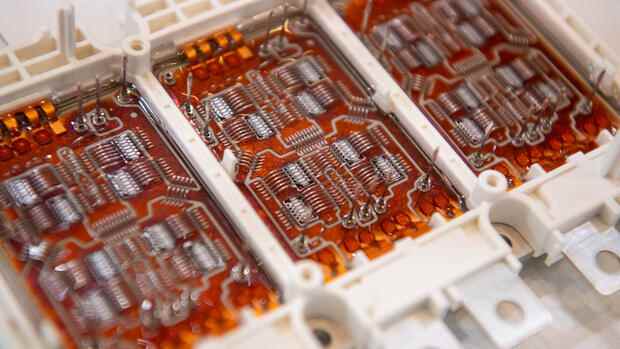Cegled It is good news, especially for the German automotive industry, which is plagued by a lack of chips: Infineon has opened a new plant in Hungary for packaging and testing semiconductors for electric vehicles. With the so-called backend factory near Budapest, the Dax group can now cover the entire value chain in Europe. Because it is significantly cheaper, the components are usually further processed in the Far East.
“We’re in the heart of Europe, that’s worth a lot,” Production Director Rutger Wijburg told Handelsblatt on the sidelines of the opening ceremony in Cegléd. Infineon is investing 100 million euros in the small town and creating 275 additional jobs. “The decision to go with Cegléd three years ago was strategically far-sighted,” emphasized the manager.
In fact, many customers in the chip industry still lack supplies. On the one hand, production capacities are scarce worldwide. This is partly due to the surprisingly high demand for electric vehicles. On the other hand, the consequences of the pandemic and lockdowns in China are still causing distortions in the supply chain.
Political tensions are also worrying buyers in the semiconductor industry, such as the dispute between the People’s Republic and Taiwan.
Top jobs of the day
Find the best jobs now and
be notified by email.
Cegléd is therefore of particular importance for Infineon: Here, semiconductors from so-called front-end factories, such as those operated by the Group in Europe in Dresden and Villach, among others, are tested in close proximity to the customer and packaged in housings. The transport around the world that is usual in the chip industry is no longer necessary.
Backend factories are labor intensive and less automated than the frontend factories. As is usual in the industry, Infineon also operates large backend plants in Asia, including in Malaysia, Indonesia and China.
With the new building next to an older plant in Cegléd, Germany’s largest chip producer has now massively expanded its capacities in Europe. This makes the supply chain much more resilient, emphasized Alexander Gorski, Head of Backend Manufacturing at Infineon. The Group’s most important German location in this area is Warstein.
Infineon can thus equip several million electric cars every year with so-called power semiconductors. According to the company, almost every second electric or hybrid vehicle produced worldwide in 2021 was equipped with Infineon chips. In addition, components for trains, industrial plants and wind turbines are manufactured in Cegléd.
Indonesians for a factory in Hungary
It is no coincidence that Infineon is investing in Hungary. The group already employs 1,500 people, some of whom are highly qualified, in Cegléd. Labor costs are only a third of the level in Germany. According to Gorski, it is even cheaper to manufacture in the greater Budapest area than at the Chinese site in Wuxi. In addition, the Hungarian state has contributed around 20 million euros in subsidies.
>>Read here: 45 percent less sales: This chip giant shows how the global economy is doing
Infineon’s commitment is an example of the success story of German-Hungarian economic relations, explained State Secretary for Trade Tamás Menczer at the inauguration of the factory. However, the politician was not very cosmopolitan in front of the German guests. “We have to protect ourselves against illegal immigration,” the 38-year-old called out to Infineon management.
A message that should cause concern for the company: Infineon relies on an open atmosphere. As in many regions of the world, it is difficult for the group to hire enough local staff in Hungary. Therefore, 35 colleagues from the Infineon plant in Indonesia are scheduled to start work in Cegléd at the beginning of November – agreed with the government and initially limited to one year.
If the attempt works, other Infineon employees from Southeast Asia could follow, says backend boss Gorski. Nobody at Infineon can say whether the people in Cegléd will feel comfortable given the government’s rather xenophobic course.
The state secretary of Prime Minister Viktor Orbán’s ruling Fidesz party did not mention the EU at all. Infineon’s investment contributes to the European Commission’s major goal of doubling Europe’s share of global chip production from less than ten percent to 20 percent by the end of the decade. This is how Europe should become more independent of the Far East.
Infineon demands more speed
The so-called Chips Act of the EU should contribute to this. According to the plans, governments will in future be able to subsidize investments by chip manufacturers much more comprehensively than before. However, the MEPs have been debating the law for months, and a decision is not expected before early 2023.
Meanwhile, Americans, Japanese and South Koreans have long since adopted similar projects and thus provided for billions in investments from leading semiconductor companies such as TSMC, Samsung, Intel and Micron.
>>Read here: Europe’s most valuable chip start-up is attacking market leader Nvidia with TSMC
It’s no wonder that Infineon Brussels is urging them to hurry. “Europe has to pick up the pace,” stressed CEO Wijburg. After all, the billions are already being distributed overseas. No global chip manufacturer can afford not to take action. At the same time, however, the corporations only need a limited number of plants.
The factory manager in Cegléd, Tamás Szabó, is meanwhile firmly assuming that the new building that has now opened will not be the end of the story. “This is just the beginning,” said the manager confidently. Infineon has acquired enough additional space to expand the site. The need is enormous: “We work around the clock and are 100 percent utilized,” said Szabó.
More: The chip industry discovers Germany – the Intel factory is just the beginning.
